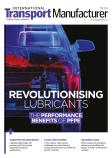There is heightened awareness on a global scale regarding the impact that industrial processes have on the environment, and Walvis Bay is no exception. As home to one of the most important wetlands in southern Africa, it is incumbent on all stakeholders, and particularly industries and businesses, not to endanger this fragile ecosystem in any way.
This is the view of Hannes Uys, Chief Executive Officer of international ship repair company Elgin Brown & Hamer (EBH) Namibia. Since the formation of the company in 2006, EBH Namibia has firmly entrenched its status as custodian of its working environment, and the role the company has to play in preventing harmful water pollution.
Accordingly, EBH Namibia has embarked on a number of initiatives in order to analyse and review its potential impact on the natural environment; and also to address concerns which may arise regarding its operations and potential environmental risks. The company is equally resolute in its compliance to local and global legislation.
“As a responsible, internationally ISO-accredited business, EBH Namibia’s environmental ethos has always been focused on pollution prevention and we adhere very strictly to all governing port regulations,” says Uys. “Health, safety, security and care of the environment take precedence in all areas of EBH Namibia’s work and operations; and we have consistently maintained an operational environment which complies with international standards and all relevant Namibian legislation.”
EBH Namibia’s strong safety ethos includes a commitment to providing a safe place of work for its employees, as well as being proactive in the prevention of emissions which may be harmful to the environment and the community, according to Uys. “We pride ourselves in not only looking after our own people, but also the wider community in which we operate. This involves ensuring a clean and healthy coastal region in which the people of Walvis Bay can work and play.”
Uys says that this overriding aim has become particularly important in the light of the company’s recent growth in operational capacity following the inclusion of its third Panamax-sized floating dock in October 2013.
“We have endeavored to maintain sustainable business practices over the years, and this has contributed to our significant growth over a relatively short period of time. We hope to engage all stakeholders to make further strides towards environmental advocacy,” he says.
The company has recently embarked on a review of its current environmental impact assessment (EIA) and environmental management plan (EMP), with the assistance of external stakeholders, and has committed itself to ongoing environmental awareness campaigns within the organisation.
In addition, EBH Namibia has recently engaged an internationally-accredited, independent expert to conduct analysis of water samples from Walvis Bay, which were compared with international standards. The subsequent report, which is still under review, has indicated that EBH Namibia is operating well within the international limits set for the protection of benthic and seashore fauna, coastal birds and sea birds.
“We are very aware of the proximity of our operations to one of Namibia’s richest and most important wetlands and its abundant fish and bird life. We will continue to be proactive by continually investing in measures to prevent the risk of water pollution and to ensure that our employees and the general public are not negatively affected by EBH’s operations in any way. EBH Namibia takes seriously the responsibility we have in not only safeguarding, but having a positive influence on, this beautiful environment in which we operate,” Uys concludes.










